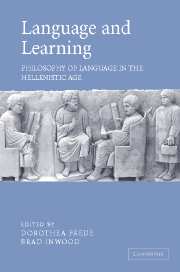Book contents
- Frontmatter
- Contents
- List of contributors
- Preface
- List of abbreviations
- Introduction
- 1 The Stoics on the origin of language and the foundations of etymology
- 2 Stoic linguistics, Plato's Cratylus, and Augustine's De dialectica
- 3 Epicurus and his predecessors on the origin of language
- 4 Lucretius on what language is not
- 5 Communicating Cynicism: Diogenes' gangsta rap
- 6 Common sense: concepts, definition and meaning in and out of the Stoa
- 7 Varro's anti-analogist
- 8 The Stoics on fallacies of equivocation
- 9 What is a disjunction?
- 10 Theories of language in the Hellenistic age and in the twelfth and thirteenth centuries
- References
- Index nominum et rerum
- Index locorum
2 - Stoic linguistics, Plato's Cratylus, and Augustine's De dialectica
Published online by Cambridge University Press: 23 November 2009
- Frontmatter
- Contents
- List of contributors
- Preface
- List of abbreviations
- Introduction
- 1 The Stoics on the origin of language and the foundations of etymology
- 2 Stoic linguistics, Plato's Cratylus, and Augustine's De dialectica
- 3 Epicurus and his predecessors on the origin of language
- 4 Lucretius on what language is not
- 5 Communicating Cynicism: Diogenes' gangsta rap
- 6 Common sense: concepts, definition and meaning in and out of the Stoa
- 7 Varro's anti-analogist
- 8 The Stoics on fallacies of equivocation
- 9 What is a disjunction?
- 10 Theories of language in the Hellenistic age and in the twelfth and thirteenth centuries
- References
- Index nominum et rerum
- Index locorum
Summary
Stoic philosophers, probably at least from the time of Chrysippus, were interested in Plato's Cratylus and were influenced by the dialogue. This is not directly attested in so many words, but its correctness is frequently and rightly assumed. Two points of similarity are self-evident. First and most significant is the Stoics' recourse to etymologising. We have copious evidence of Stoic etymologies, especially for the names of gods. Some of these etymologies are identical to ones advanced by Socrates in the Cratylus, and the principles involved are also identical: interpreting the name under investigation by aligning it with one or more words whose meaning is known, on the basis of phonetic similarity between the two sets of words. Thus the Stoics, like Plato's Socrates, explain the name Zeus and its inflection Dia by reference to zēn, ‘to live’, and dia meaning ‘because of’: the name Zeus signifies ‘the cause of life’.
The second point of immediate similarity is the concept of elementary or primary sounds that signify things mimetically. Socrates advances this proposal as an analytical device for discovering whence names, that are compounded out of letters and syllables, derive their capacity for representing things correctly, i.e. as they really are (421c–425c). He then develops the hypothesis that the ancients took elementary sounds or letters to imitate things or properties of things, especially motion.
- Type
- Chapter
- Information
- Language and LearningPhilosophy of Language in the Hellenistic Age, pp. 36 - 55Publisher: Cambridge University PressPrint publication year: 2005
- 42
- Cited by



